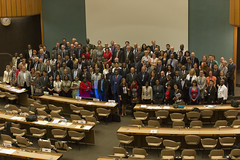Tripartism and migration
Social dialogue for improved labour migration policy and governance
 |
It is essential to recognize how labour migration affects labour markets and how the participation of social partners can help incorporate a social dimension into labour migration policies. Social partners can provide early information on labour market needs and should also be consulted on labour migration admission policies, e.g. in the establishment of quotas, shortage occupation lists, etc.
Labour migration and free circulation of labour are increasingly featuring on the agenda of regional integration processes. Indeed, experience has shown that regional agreements on labour migration often have a more immediate impact on how people move, and under what conditions, than international conventions or treaties. This underscores the need for regional policy approaches and coordination for the harmonisation of labour policies, including on policy issues such as recognition of professional qualifications, social security coverage and portability of benefits. The inclusion of mechanisms for social dialogue is consequently essential also at the sub-regional and regional levels.
The ILO Tripartite Technical Meeting on Labour Migration held in November 2013 is itself a good example of social dialogue around labour migration issues. The experts at the meeting reiterated that “Through social dialogue at local, national, bilateral, sub-regional, regional and international levels, the ILO’s tripartite constituents can play an important role in the development of rights-based, transparent and coherent labour migration legislation and policies, taking account of labour market needs.” Conversely, successful social dialogue at the international and regional levels is strongly connected to the establishment of robust mechanisms and processes at the national level.